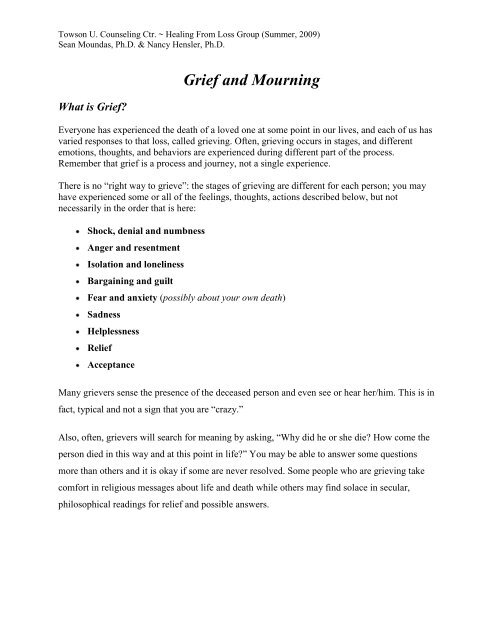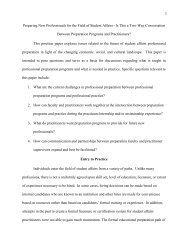Session 1--Intro to Grief and Mourning.pdf
Session 1--Intro to Grief and Mourning.pdf
Session 1--Intro to Grief and Mourning.pdf
You also want an ePaper? Increase the reach of your titles
YUMPU automatically turns print PDFs into web optimized ePapers that Google loves.
Towson U. Counseling Ctr. ~ Healing From Loss Group (Summer, 2009)<br />
Sean Moundas, Ph.D. & Nancy Hensler, Ph.D.<br />
What is <strong>Grief</strong>?<br />
<strong>Grief</strong> <strong>and</strong> <strong>Mourning</strong><br />
Everyone has experienced the death of a loved one at some point in our lives, <strong>and</strong> each of us has<br />
varied responses <strong>to</strong> that loss, called grieving. Often, grieving occurs in stages, <strong>and</strong> different<br />
emotions, thoughts, <strong>and</strong> behaviors are experienced during different part of the process.<br />
Remember that grief is a process <strong>and</strong> journey, not a single experience.<br />
There is no “right way <strong>to</strong> grieve”: the stages of grieving are different for each person; you may<br />
have experienced some or all of the feelings, thoughts, actions described below, but not<br />
necessarily in the order that is here:<br />
Shock, denial <strong>and</strong> numbness<br />
Anger <strong>and</strong> resentment<br />
Isolation <strong>and</strong> loneliness<br />
Bargaining <strong>and</strong> guilt<br />
Fear <strong>and</strong> anxiety (possibly about your own death)<br />
Sadness<br />
Helplessness<br />
Relief<br />
Acceptance<br />
Many grievers sense the presence of the deceased person <strong>and</strong> even see or hear her/him. This is in<br />
fact, typical <strong>and</strong> not a sign that you are “crazy.”<br />
Also, often, grievers will search for meaning by asking, “Why did he or she die? How come the<br />
person died in this way <strong>and</strong> at this point in life?” You may be able <strong>to</strong> answer some questions<br />
more than others <strong>and</strong> it is okay if some are never resolved. Some people who are grieving take<br />
comfort in religious messages about life <strong>and</strong> death while others may find solace in secular,<br />
philosophical readings for relief <strong>and</strong> possible answers.
Towson U. Counseling Ctr. ~ Healing From Loss Group (Summer, 2009)<br />
Sean Moundas, Ph.D. & Nancy Hensler, Ph.D.<br />
For How Long Will I Grieve?<br />
There is no set time limit for grief. Some individuals are in bereavement for over a period of two<br />
years or even longer, while others may resolve their feelings in several months. These<br />
experiences are affected by many fac<strong>to</strong>rs, such as the depth <strong>and</strong> length of relationship with the<br />
loved one.<br />
Generally, the grieving process is complete when you have accepted that your loved is with you<br />
only in spirit. For some people, the process does not end but becomes easier with time. You will<br />
know you are ready <strong>to</strong> move forward when you can devote the energy you once put in your loved<br />
on a new place, activity or person.<br />
Coping with <strong>Grief</strong> by <strong>Mourning</strong><br />
What is <strong>Mourning</strong>?<br />
While grief is your internal thoughts <strong>and</strong> feelings about the person you have lost, mourning is<br />
how you express those reactions <strong>to</strong> others. <strong>Mourning</strong> is an active process essential <strong>to</strong> healing<br />
from loss.<br />
Healthy Ways <strong>to</strong> Mourn:<br />
-Gently confront the reality that the person is no longer living.<br />
-Take care of yourself physically, mentally <strong>and</strong> emotionally. If you have a mental health problem<br />
such as depression, anxiety, or substance abuse, get treatment for it.<br />
-Remember that both your positive (e.g., relief) <strong>and</strong> negative (anger, sadness) feelings are valid.<br />
-Be compassionate <strong>to</strong> yourself if you have “grief bursts” in which your grief is more intense than<br />
at other times such as at holidays <strong>and</strong> at death anniversaries. It may be important <strong>to</strong> schedule<br />
positive <strong>and</strong> pleasurable activities during these times.<br />
-Be patient with yourself <strong>and</strong> underst<strong>and</strong> that you may feel childlike at times because of feelings<br />
of helplessness <strong>and</strong> dependency.<br />
-Use relaxation strategies <strong>to</strong> cope with anxiety.<br />
-Keep a journal (paper or electronic) <strong>to</strong> record your feelings <strong>and</strong> thoughts.
Towson U. Counseling Ctr. ~ Healing From Loss Group (Summer, 2009)<br />
Sean Moundas, Ph.D. & Nancy Hensler, Ph.D.<br />
-Consider writing a letter <strong>to</strong> the person you have lost.<br />
-Ask for <strong>and</strong> accept help from websites, books, family, friends, professors, religious/spiritual<br />
leaders, <strong>and</strong>/or mental health professionals.<br />
-If you are a member of a religious organization, contact people there <strong>and</strong> possibly become more<br />
involved. Places of worship are often very supportive during times of loss.<br />
-If certain family traditions (e.g., singing songs at holiday gatherings) are causing you<br />
discomfort, try <strong>to</strong> avoid them.<br />
-Instead of trying <strong>to</strong> avoid thinking about the person whom you have lost, ask friends <strong>and</strong> family<br />
members <strong>to</strong> share their memories of that person using s<strong>to</strong>ries, pho<strong>to</strong>graphs <strong>and</strong> other<br />
memorabilia.<br />
-Create a memorial service by honoring the person’s accomplishments <strong>and</strong> values. If possible, it<br />
may be helpful <strong>to</strong> plant a garden or make a donation in the person’s name.<br />
-Accept that your identity may have changed because of the loss. To illustrate, you may no<br />
longer be a wife but now a widow. You may have <strong>to</strong> assume responsibilities previously done by<br />
the deceased person. However, try not <strong>to</strong> take on (<strong>to</strong>o many) new responsibilities.<br />
Some Myths <strong>and</strong> Facts About <strong>Grief</strong> can be found at:<br />
http://childrensroom.org/resources/common-myths-facts-about-grief/

















